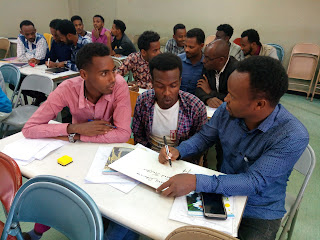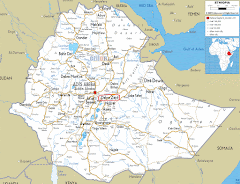“Meserete Kristos Seminary is a good place to study.” Learning about paragraph support, my students recently worked with that topic sentence. In small groups (and excited about the white boards and markers I had brought along), they listed things that make MKS good:
- Good teaching
- Full materials
- Library
- Good dorm
- Good food
- Good Wi-Fi connection
- Biblical focus
- Farmland
- Peaceful
My students seem pleased with the institution they have chosen. While I may think of what the seminary lacks, they think of what it has. (Pictured here is the main building with classrooms and offices.) 2,179 students have now graduated from Meserete Kristos Seminary (28 years after it began). Here’s the history in brief:
- 1994 The seminary began as a Bible institute.
- 1996 Ten graduates received diplomas in the first graduation.
- 1997 The institution became a college.
- 2007 The college moved from a rented space in Addis Abebe to a new campus in Debre Zeit.
- 2020 The college became Meserete Kristos Seminary.
The seminary seeks to train people to serve the church and society. 203 students are currently enrolled, taught by 13 full-time and 4 part-time faculty. Students can choose from four majors:
- Bible and Theology
- Mission and Intercultural Studies
- Peace and Development
- Leadership and Management
Mennonites have an amazing story of church growth in Ethiopia. The first 10 Ethiopians were baptized by Mennonite missionaries in 1951, marking the beginning of the Meserete Kristos Church (meaning Christ is the Foundation).
After a military coup in 1974 and the subsequent communist regime, the church was forced underground. Ethiopian Mennonites began to worship in secret, just as our Anabaptist ancestors did in Europe in the 16th century.
From 1982 to 1992, during the time of underground worship, church membership grew drastically from 5,000 to 34,000. Today, Ethiopia has one of the largest Mennonite memberships in the world (300,000).
Mennonite World Conference membership numbers as of 2018:
- United States—500,000
- Ethiopia—310,000
- India—257,000
- Congo—225,000
- Canada—149,000
- Mexico—110,000
- Indonesia—102,000
A seminary like Meserete Kristos can hardly keep up with the needs of the Mennonite church here, which continues to grow rapidly.
I recently had the pleasure of spending a day with the Mennonite Central Committee country representatives Paul and Rebecca Mosley and some of MCC’s local staff. It was great to make personal connections and learn a bit about MCC’s work in Ethiopia.
Here at Meserete Kristos Seminary, I am not the lone Mennonite volunteer. Werner and Joanne De Jong are at MKS for three years under Mennonite Church Canada. It is great to be able to talk together about the joys and challenges of living in another country.
For a good overview of where I work and live, here’s a 12-minute video in which a former Mennonite volunteer describes his experience. Video on MK Seminary
To hear three Ethiopians talking about the persecution and growth of the Mennonite church, this is an excellent 10-minute video. Video on MK Church








No comments:
Post a Comment